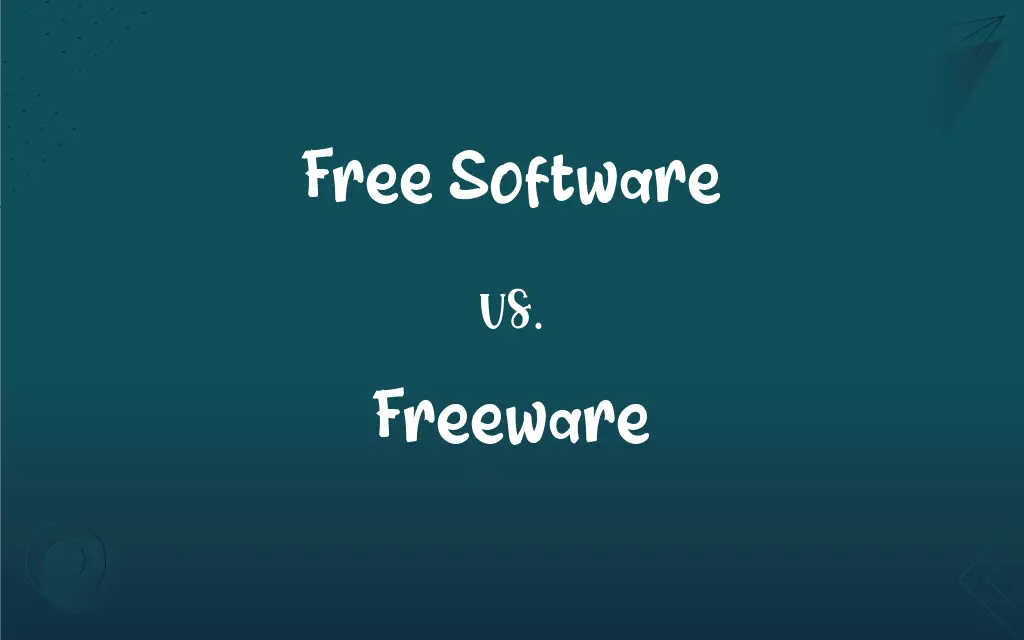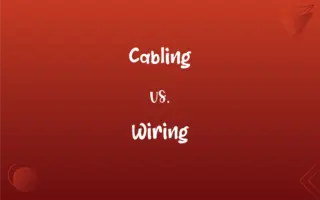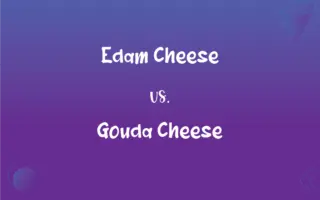Free Software vs. Freeware: What's the Difference?
Edited by Aimie Carlson || By Janet White || Published on January 4, 2024
Free software allows users to freely use, modify, and redistribute the code, while freeware is free to use but without modification or redistribution rights.

Key Differences
"Free software" refers to software that grants users the freedom to run, study, modify, and distribute the software and its source code. "Freeware," on the other hand, is simply software that's available at no cost but usually without access to its source code.
Free software is often associated with open-source communities, emphasizing collaborative development and sharing. In contrast, freeware is typically developed by individuals or companies and distributed free of charge, without necessarily promoting collaboration or modification rights.
The philosophy behind free software is to promote freedom and control over the software for the user, which is not the primary goal of freeware. Freeware is more about providing a no-cost solution, often as a strategy to gain users or for altruistic reasons.
With free software, users can adapt and improve the software to meet their needs, a liberty not typically granted with freeware. Freeware often comes "as-is," and users cannot legally alter or redistribute it.
Licensing is a significant difference: free software usually comes with licenses like GNU GPL that maintain user freedoms, whereas freeware might not have such a license, limiting user rights despite being free of cost.
ADVERTISEMENT
Comparison Chart
User Freedoms
Use, modify, and redistribute
Use only, no modification or redistribution
Source Code Access
Typically available
Usually not available
Philosophy
Promotes user freedom and control
Provides software for free without additional freedoms
Collaboration
Encourages collaborative development
Often developed and distributed by single entities
Licensing
Open-source licenses like GNU GPL
No specific licensing for user freedoms
ADVERTISEMENT
Free Software and Freeware Definitions
Free Software
Software under licenses like GNU GPL.
The VLC Media Player is free software, licensed under the GPL, allowing modifications.
Freeware
Software available at no cost.
Skype is freeware, offering free communication tools without a purchase price.
Free Software
Software with the freedom to use, study, and modify.
Linux is a popular example of free software, widely modified by its user community.
Freeware
Software without the freedom to modify.
Adobe Acrobat Reader is freeware but does not allow users to alter its code.
Free Software
Software allowing free redistribution of copies.
GIMP, a free software, can be freely distributed and shared with others.
Freeware
Software usually not open source.
Google Earth is freeware, allowing free use without access to its source code.
Free Software
Software focusing on user rights and freedoms.
Firefox, as free software, supports user freedom in internet browsing.
Freeware
Software often used as a marketing tool.
Many antivirus programs are available as freeware to introduce users to a brand.
Free Software
Software distributed with its source code.
Apache Web Server, as free software, provides its source code for users to examine and alter.
Freeware
Software typically distributed in a ready-to-use format.
WinRAR is distributed as freeware, providing file compression tools in a fixed format.
Freeware
Software that is available for free, usually over the internet.
Freeware
(software) Complete and functional software that does not require payment or other compensation (such as viewing advertising) for its use. Freeware may be a proprietary license with no access to the source code.
Freeware
Software that is provided without charge
FAQs
Can freeware be sold?
No, freeware is defined by being available at no cost.
What is the main goal of free software?
To grant users the freedom to use, modify, and redistribute the software.
Can freeware be modified?
Typically, no. Freeware is free to use but usually doesn’t allow modification.
Is all free software open source?
Generally, yes, as it includes access to source code and modification rights.
Are free software and freeware the same in terms of cost?
Yes, both are available for free, but they differ in user rights and freedoms.
What types of licenses are used for free software?
Licenses like GNU GPL, which ensure user freedoms, are common.
Can free software become proprietary?
Modified versions can, depending on the license, but original code remains free.
Is freeware less secure than paid software?
Security depends on the specific software, not its price.
Why do developers release software for free?
Various reasons, from supporting open-source community values to marketing strategies.
Can businesses use free software commercially?
Yes, but they must adhere to the software’s licensing terms.
Are there restrictions on using freeware for certain purposes?
Yes, some freeware may have restrictions on use in commercial or enterprise environments.
Do both free software and freeware come with support?
Support varies; free software often has community support, while freeware may or may not offer support.
Can I redistribute freeware?
Generally, no. Freeware redistribution rights are usually restricted.
Is freeware always available for personal and commercial use?
Not necessarily, it depends on the specific terms set by the freeware provider.
Can I request new features in free software?
Yes, and you can even contribute code in many cases.
How do developers profit from free software?
Through donations, support services, or related commercial ventures.
Do free software and freeware always stay free?
Typically, yes, although the terms and conditions may change over time.
How can I contribute to a free software project?
Through coding, documentation, testing, or donations.
Do free software and freeware differ in quality?
Quality varies and is not necessarily related to whether software is free or freeware.
Is all freeware safe to download?
Not necessarily; it's important to download from reputable sources.
About Author
Written by
Janet WhiteJanet White has been an esteemed writer and blogger for Difference Wiki. Holding a Master's degree in Science and Medical Journalism from the prestigious Boston University, she has consistently demonstrated her expertise and passion for her field. When she's not immersed in her work, Janet relishes her time exercising, delving into a good book, and cherishing moments with friends and family.
Edited by
Aimie CarlsonAimie Carlson, holding a master's degree in English literature, is a fervent English language enthusiast. She lends her writing talents to Difference Wiki, a prominent website that specializes in comparisons, offering readers insightful analyses that both captivate and inform.







































































